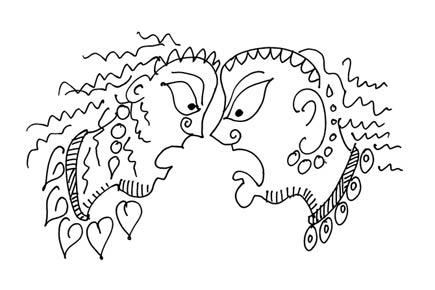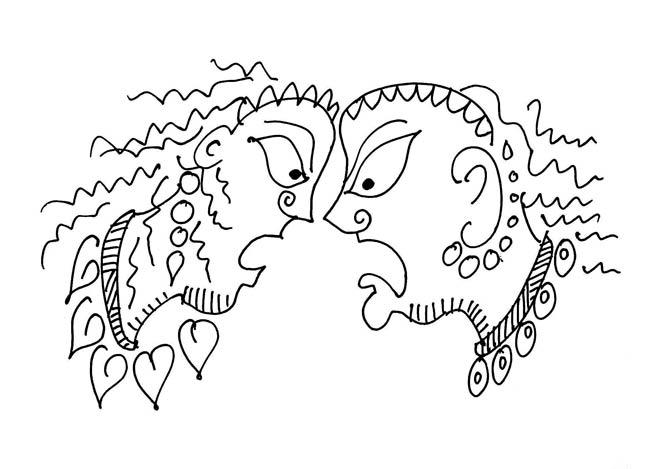Why do people argue? I believe the roots of argument can be located in monotheism

 Why do people argue? I believe the roots of argument can be located in monotheism. That there is only one God. In modern rational atheist mythology, this translates as there is, and can be, only one Truth. As soon as we submit to this assumption, we fight. Physically it manifests as war. Conversationally it manifests as argument.
Why do people argue? I believe the roots of argument can be located in monotheism. That there is only one God. In modern rational atheist mythology, this translates as there is, and can be, only one Truth. As soon as we submit to this assumption, we fight. Physically it manifests as war. Conversationally it manifests as argument.

Illustration/Devdutt Pattanaik
ADVERTISEMENT
In ancient times, in Mesopotamia, the idea of a ‘city god’ was used to unite a city full of people belonging to various tribes and clans. When cities fought, the ‘city god’ represented by the ‘city king’, would clash.
The victorious god would either smash the defeated god, or keep him/her as a junior deity in his shrine. Thus the temples came to have multiple gods, with one dominating god. Eventually these myriad Mesopotamian gods were overpowered by one god, a god without form, revealed Zoraster of Persia, Moses of Egypt, Jesus of Judea and Muhammad of Arabia. Eventually, with rise of rationality, the idea of ‘nation state’ replaced the notion of the ‘city god’, evoking the same familiar passion and rage, replacing only devotion with patriotism.
In ‘rational’ times, when wars are frowned upon, academicians have taken it upon themselves to popularise a different kind of violence: cognitive violence, which is essentially war of ideas in the quest for ‘the truth’. It began with the notion that intellectual growth can only happen through ‘argument’. So old ideas were argued out cantankerously by new ideas. It was called the philosopher’s way: where words are weapons.
A ‘discourse’ is just seen as a weapon to subjugate the mind. In universities scholars are asked to ‘present their arguments’ and ‘defend their thesis’ full of evidence and testimonies. Eventually, we create cognitive territories such as patent and intellectual property rights, for it fuels ego-orgasms on one hand and commerce on the other.
The scholar, his signature, his acknowledgment, becomes more important than the scholarship. People argue passionately; it is morally right. But it also fuels cult behaviour. Also many enjoy debating as it indulges the animal need to dominate and the perverse human desire to violate, albeit non-violently.
A good scientist knows that science must never be seen in religious terms: science seeks facts, not truth. Quest for fact is to enable better understanding of the world that is infinite and continuously expanding and so never static.
Rationalists and liberal thinkers seeking, or arguing, one truth in politics or economics are really no different from missionaries, or salesmen. Memories are multiple, though history seeks to be only ‘one’. In argument, we trample over other views because the other is ‘irrational’. We have made irrationality akin to sin and pollution. Arguments leave the defeated, who may not be articulate or forceful or determined enough, to feel violated, stripped of all self-worth and self-esteem, akin to a kind of ‘cognitive rape’, which many triumphant debators gleefully enjoy and seek.
In ancient times, people loved gladiator games. There is always an audience for a bull fight or a rooster fight. But now that we frown upon violence, but we entertain ourselves through argument on TV shows. We forget there is a world of ideas beyond argument. There is sam-vaad or deliberations and discussions of the Upanishads, very different from vi-vaad or debates of later Vedanta scholars seeking triumph (dig-vijaya) over other schools of thought. In debates, one truth prevails; the others are cast aside, violated. In discussions, diverse truths prevail, and the wisdom and wherewithal to accommodate them. Take your pick.
The author writes and lectures on relevance of mythology in modern times. Reach him at devdutt@devdutt.com. The views expressed in these column are the individual’s and don’t represent those of the paper.
 Subscribe today by clicking the link and stay updated with the latest news!" Click here!
Subscribe today by clicking the link and stay updated with the latest news!" Click here!







